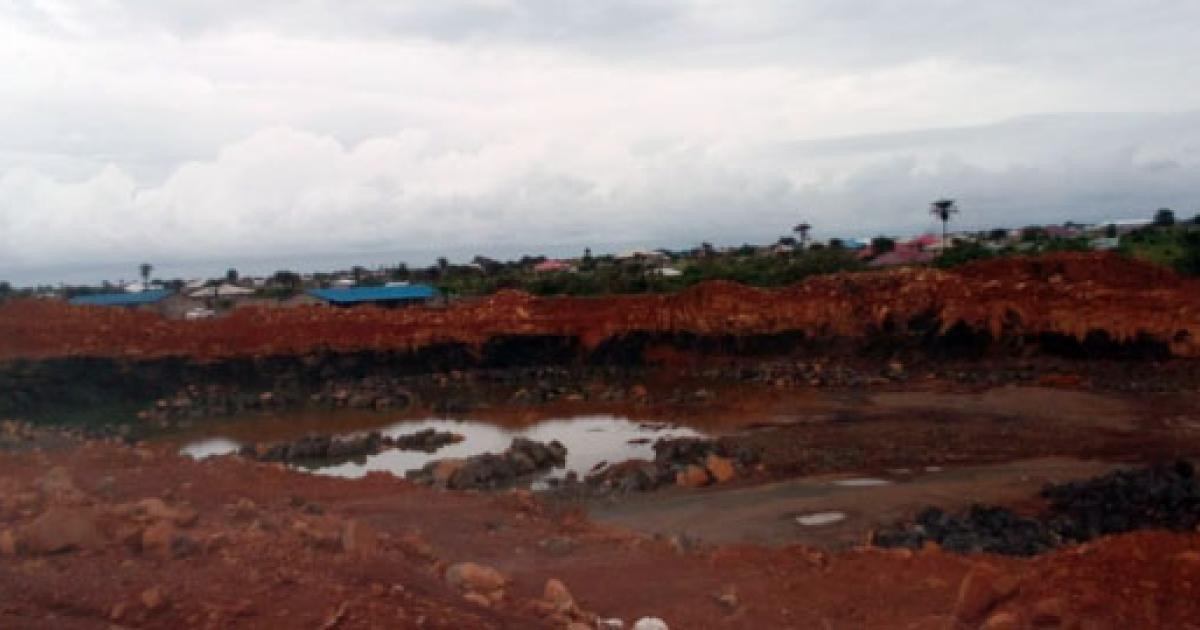TINA S. MEHNPAINE
Africa-Press – Liberia. Ben Town, Margibi County remains a battleground for environmental conservation, as Chinese rock quarry, Fengshou International, continues its destructive activities in the wetland area situated near the Scheifflin Military Barracks where the Marshall Road diverges from the Roberts International Highway. The company, censured last month by the Environmental Protection Agency (EPA) for building a makeshift road through the Marshall Wetlands, is now blasting rocks to service the ongoing RIA road expansion project.
A tall black man projects a warning through his megaphone: “If you are in your house, come outside, we are about to blast.” He is the walking alarm system set up by Fengshou to warn Ben Town residents to leave the area during the explosions. The quarry carries out blasting operations two or three times a day, forcing villagers to vacate their homes, during explosions.
“If they sound the warning, and you go there, anything happens to you, nobody is responsible,” said Musu Tulay. She is not alone. Residents say, regardless of their condition —whether ill or disabled — once the alarm is sounded, they must leave their houses immediately until the blasting stops. This warning can be issued at any time of the day, and without prior notice.
“We are living here in fear because of the blasting. They are treating us like animals,” Esther Johnson says. She is not just referring to the thunderous sound of the explosions. She and her neighbors now eat, sleep, and breathe the impacts of Fengshou’s rock crushing activity.
Each blast emits billows of white dust that lingers in the air over Ben Town and its environs, several hours after the fact. Residents inevitably inhale and imbibe the dust, raising questions regarding long term respiratory effects of the Chinese company’s activities.
The physical impact on residents’ homes is no less destructive, especially those closer to the quarry. One of these belongs to Eveylne Gaylah. Her three-bedroom abode, not far from the site, has cracked from the foundation up four feet to the window sill, due to the severe shaking from the blasts.
“Look at my house,” Gaylah complains, pointing to the damaged wall. “It cracked. When I told one of the company big man, he promised to give us cement to fix it, but we have not seen it.” The thirty-six-year-old, and mother of four grew impatient with the company’s refusal to compensate her for the ruin to her property, so she fought to fix it herself.
Her neighbor, Tamba Williams, says “After the blasting you only have to look at your house for cracking marks or roof damage. We feel the vibration when they blast. It is powerful enough to knock down small children.”
Rock blasting is the use of explosives to break up large bodies of rock. It involves the drilling of holes in a rock mass at specific depths and spaces to maximize the impact of the explosive in fracturing the rock to the desired size. In Fengshou’s case, the intended size of the finished product is smaller crushed rocks, which its parent company, EAST International, uses as a base material for the expansion and pavement of the RIA Highway.
Unlike the reported pavement of a road to transport the crushed rocks to the construction site, which Ben Town dwellers had decried as environmentally degrading at the outset, homeowners walked into this new predicament well aware of the risks.
When EAST International was awarded the $116 million contract to expand the RIA road, commencing in September 2022, the company engaged Ben Town land owners expressing its intent to establish a quarry to supply crushed rocks for the construction works. But the EPA stepped in with the Ministry of Lands, Mines, and Energy to warn residents of the the impact of the blasting. According to the residents, the warning had been verbally issued, with the EPA and MLME explaining the disadvantages of EAST International’s operations.
According to Oceancy Gbonoe, the town’s administrative secretary, Ben Town residents reached an agreement with EAST International, regardless, granting it control of the quarry area. The company pledged to compensate the town in cash and kind. It had agreed to pay”US$6,000 every year to the administration,” Gbonoe said, along with the construction of four pit latrines, four hand pumps, the renovation of the town hall, and the employment of locals at the qarry. Adding Gbonoe, “they were supposed to do these things for us before starting the work, but they never did, and even up to now they have not done anything for us.” The company, he says, has only paid US$6,000 to the administrative board, which it shared among the heads of resident families.
Asked about the nature of the negotiations and agreement, Gbonoe indicated that the agreement with East International and Fengshou was verbal and that no legal counsel was involved representing Ben Town residents. East International, on the other hand, was represented by the former Land Commissioner.
Beyond its failure to fully compensate residents for the use of their land, Gbonoe claims Fenshui has been selling crushed rocks, not merely trucking them to the company’s construction site. Selling rocks was neither part of the negotiations nor the agreement.
“They told us that the rock crusher was supposed to supply the Robert Field Highway road project, so the citizens embraced it.”
Ben Town residents have sought redress to no avail. According to Gbonoe, residents have approached East Internationals’ manager, identified only as William, with complaints about cracking in their homes. The manager’s response has been sporadic.
“We continue engaging the company through their manager William. Sometimes we call him, sometimes he don’t pick up the call, sometimes he answer us the other time. To answer his call it hard you call him, he will tell you I will call back but it hard.” The Daily Observer also attempted to contact Williams, who could not be reached for comment.
Despite this apparent intransigence, Tenneh Jackson has no intention of leaving. “Where do we go with our families,” she asked? “We will just continue to bear the shaking sound till the company can be finished with the area. Jackson and many of her neighbors have properties and have built a life in the area. Their aim is to assert their legitimate ownership of the land and demand just compensations for the quarry’s environmental pollution.
The Fengshou quarry has had a comprehensively destabilizing impact on Ben Town and its neighboring communities up and down the Junk River, which runs parallel to the RIA highway. Local fishermen along the river have been unable to fish, since the company built the dirt road across the Marshall Wetland. The constant blasting that rushes residents out of their homes multiple times a day, and causes expensive structural damages, has only compounded the challenge.
However, Ben Town has made an informed decision, against the EPA and MLME’s recommmendaton. It is, therefore, unclear what redress either entity is likely to afford the community, in view of a nonbinding verbal agreement.
Fengshou International is a Chinese rock quarry belonging to EAST International, the company hired to expand the Roberts International Airport road. The company used explosives to blast rock before crushing it into smaller pieces for sale.
Source: Liberian Observer
For More News And Analysis About Liberia Follow Africa-Press






